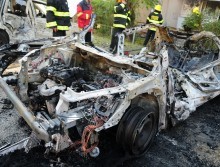
Is another war on the horizon? Israeli car hit by rocket. Illustrative. Photo Courtesy of IDF Spokesperson.
The Iranians have never been shy about their support for terrorist groups attacking Israel. But their latest rhetoric, which implied that they would either use or at least expect these terror groups to retaliate against Israel over the death of an Iranian commander, remind us the Iranians are more than just arms dealers.
The airstrike that killed an Iranian military commander and six Hezbollah terrorists last Sunday led to outbursts by a variety of Iranian Revolutionary Guards Corp (IRGC) and military officials. Hezbollah and Iran quickly blamed Israel for the attack. However, what stood out is that the Iranian comments promised that their terror proxies would take revenge on Israel.
Iran promised that their support for Palestinian terrorists and Hezbollah would increase and that “devastating thunderbolts” awaited Israel from those groups, according to a report from the Fars News Agency. Commander IRGC Major General Mohammad Ali Jafari promised that “anti-Israel resistance” groups would respond to the attack, according to Fars.
Resistance groups tend to be a euphemism for Palestinian terror groups and Hezbollah, and Jafari left little doubt by promising Iran’s military aid would exceed what was sent during the Hamas and Hezbollah wars with Israel.
“The IRGC will remain steadfast on the path to the collapse of the Zionist regime of Israel through its continued support for the Lebanese and Palestinian combatants,” said Jafari.
But how can Iran predict the response of the groups receiving their aid? At the least, such comments imply that Iran will expect that the terror groups will retaliate on Iran’s behalf.
Such sentiments take Iran’s support of Hamas, Hezbollah, Islamic Jihad and others from just sharing political goals to showing Iran to be a terrorist puppet-master.
The Iranians have long been thought to be involved in Hezbollah terrorism, including the bombings in Argentina in the 1990s. Iran has long boasted of its support for Hezbollah and Palestinian terrorists, even claiming on Fars that they helped the Palestinians improve their rocket capabilities against Israel.
But the latest comments seem to emphasize that Iran’s military support has strings attached—and that Iran therefore feels it can pull some strings to orchestrate third-party attacks on Israel.
Fars also reported that IRGC Lieutenant Commander Brigadier General Hossein Salami noted that Israel has “seen IRGC’s reactions before, and… they should be waiting for crushing responses” to last Sunday’s airstrike.
That sounds like a direct Iranian attack, but could also further underscore the level of control the Iranians have over their terror proxies. Think of Iran as a terrorist mob boss with plenty of foot soldiers to do its dirty work.
If anything, the comments only further indicate that the Iranians are sponsors of terrorism and demonstrate the threat Israel faces from Iran and its allies—hence last Sunday’s air strike took out multiple important members of Hezbollah and looks very similar to American air strikes on Al-Qaeda.
But moving forward, the world should be watching Hezbollah and the Palestinian groups and be quick to blame Iran for any terrorism perpetrated by those organizations. After all, Iran seemed to have an unusual knowledge about the terror groups’ planned attacks.
(By Joshua Spurlock, www.themideastupdate.com, January 25, 2015)
